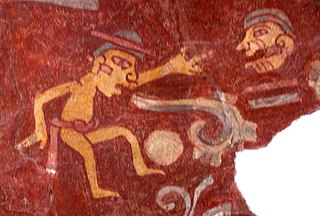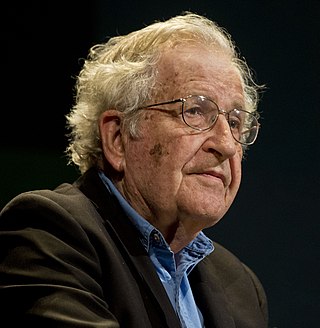Evolutionary linguistics or Darwinian linguistics is a sociobiological approach to the study of language. Evolutionary linguists consider linguistics as a subfield of sociobiology and evolutionary psychology. The approach is also closely linked with evolutionary anthropology, cognitive linguistics and biolinguistics. Studying languages as the products of nature, it is interested in the biological origin and development of language. Evolutionary linguistics is contrasted with humanistic approaches, especially structural linguistics.

Language is a structured system of communication that consists of grammar and vocabulary. It is the primary means by which humans convey meaning, both in spoken and written forms, and may also be conveyed through sign languages. Human language is characterized by its cultural and historical diversity, with significant variations observed between cultures and across time. Human languages possess the properties of productivity and displacement, which enable the creation of an infinite number of sentences, and the ability to refer to objects, events, and ideas that are not immediately present in the discourse. The use of human language relies on social convention and is acquired through learning.
Language acquisition is the process by which humans acquire the capacity to perceive and comprehend language. In other words, it is how human beings gain the ability to be aware of language, to understand it, and to produce and use words and sentences to communicate.
In linguistics, syntax is the study of how words and morphemes combine to form larger units such as phrases and sentences. Central concerns of syntax include word order, grammatical relations, hierarchical sentence structure (constituency), agreement, the nature of crosslinguistic variation, and the relationship between form and meaning (semantics). There are numerous approaches to syntax that differ in their central assumptions and goals.

Universal grammar (UG), in modern linguistics, is the theory of the innate biological component of the language faculty, usually credited to Noam Chomsky. The basic postulate of UG is that there are innate constraints on what the grammar of a possible human language could be. When linguistic stimuli are received in the course of language acquisition, children then adopt specific syntactic rules that conform to UG. The advocates of this theory emphasize and partially rely on the poverty of the stimulus (POS) argument and the existence of some universal properties of natural human languages. However, the latter has not been firmly established, as some linguists have argued languages are so diverse that such universality is rare, and the theory of universal grammar remains controversial among linguists.

Steven Arthur Pinker is a Canadian-American cognitive psychologist, psycholinguist, popular science author, and public intellectual. He is an advocate of evolutionary psychology and the computational theory of mind.
In linguistics, transformational grammar (TG) or transformational-generative grammar (TGG) is part of the theory of generative grammar, especially of natural languages. It considers grammar to be a system of rules that generate exactly those combinations of words that form grammatical sentences in a given language and involves the use of defined operations to produce new sentences from existing ones.
Cognitive linguistics is an interdisciplinary branch of linguistics, combining knowledge and research from cognitive science, cognitive psychology, neuropsychology and linguistics. Models and theoretical accounts of cognitive linguistics are considered as psychologically real, and research in cognitive linguistics aims to help understand cognition in general and is seen as a road into the human mind.

Generative grammar is a theoretical approach in linguistics that regards grammar as a domain-specific system of rules that generates all and only the grammatical sentences of a given language. In light of poverty of the stimulus arguments, grammar is regarded as being partly innate, the innate portion of the system being referred to as universal grammar. The generative approach has focused on the study of syntax while addressing other aspects of language including semantics, morphology, phonology, and psycholinguistics.
A linguistic universal is a pattern that occurs systematically across natural languages, potentially true for all of them. For example, All languages have nouns and verbs, or If a language is spoken, it has consonants and vowels. Research in this area of linguistics is closely tied to the study of linguistic typology, and intends to reveal generalizations across languages, likely tied to cognition, perception, or other abilities of the mind. The field originates from discussions influenced by Noam Chomsky's proposal of a Universal Grammar, but was largely pioneered by the linguist Joseph Greenberg, who derived a set of forty-five basic universals, mostly dealing with syntax, from a study of some thirty languages.
The Language Acquisition Device (LAD) is a claim from language acquisition research proposed by Noam Chomsky in the 1960s. The LAD concept is a purported instinctive mental capacity which enables an infant to acquire and produce language. It is a component of the nativist theory of language. This theory asserts that humans are born with the instinct or "innate facility" for acquiring language. The main argument given in favor of the LAD was the argument from the poverty of the stimulus, which argues that unless children have significant innate knowledge of grammar, they would not be able to learn language as quickly as they do, given that they never have access to negative evidence and rarely receive direct instruction in their first language.
The language module or language faculty is a hypothetical structure in the human brain which is thought to contain innate capacities for language, originally posited by Noam Chomsky. There is ongoing research into brain modularity in the fields of cognitive science and neuroscience, although the current idea is much weaker than what was proposed by Chomsky and Jerry Fodor in the 1980s. In today's terminology, 'modularity' refers to specialisation: language processing is specialised in the brain to the extent that it occurs partially in different areas than other types of information processing such as visual input. The current view is, then, that language is neither compartmentalised nor based on general principles of processing. It is modular to the extent that it constitutes a specific cognitive skill or area in cognition.
The cognitive revolution was an intellectual movement that began in the 1950s as an interdisciplinary study of the mind and its processes, from which emerged a new field known as cognitive science. The preexisting relevant fields were psychology, linguistics, computer science, anthropology, neuroscience, and philosophy. The approaches used were developed within the then-nascent fields of artificial intelligence, computer science, and neuroscience. In the 1960s, the Harvard Center for Cognitive Studies and the Center for Human Information Processing at the University of California, San Diego were influential in developing the academic study of cognitive science. By the early 1970s, the cognitive movement had surpassed behaviorism as a psychological paradigm. Furthermore, by the early 1980s the cognitive approach had become the dominant line of research inquiry across most branches in the field of psychology.
In linguistics, linguistic competence is the system of unconscious knowledge that one knows when they know a language. It is distinguished from linguistic performance, which includes all other factors that allow one to use one's language in practice.
Poverty of the stimulus (POS) is the controversial argument from linguistics that children are not exposed to rich enough data within their linguistic environments to acquire every feature of their language. This is considered evidence contrary to the empiricist idea that language is learned solely through experience. The claim is that the sentences children hear while learning a language do not contain the information needed to develop a thorough understanding of the grammar of the language.
In the field of psychology, nativism is the view that certain skills or abilities are "native" or hard-wired into the brain at birth. This is in contrast to the "blank slate" or tabula rasa view, which states that the brain has inborn capabilities for learning from the environment but does not contain content such as innate beliefs. This factor contributes to the ongoing nature versus nurture dispute, one borne from the current difficulty of reverse engineering the subconscious operations of the brain, especially the human brain.
In linguistics, the innateness hypothesis, also known as the nativist hypothesis, holds that humans are born with at least some knowledge of linguistic structure. On this hypothesis, language acquisition involves filling in the details of an innate blueprint rather than being an entirely inductive process. The hypothesis is one of the cornerstones of generative grammar and related approaches in linguistics. Arguments in favour include the poverty of the stimulus, the universality of language acquisition, as well as experimental studies on learning and learnability. However, these arguments have been criticized, and the hypothesis is widely rejected in other traditions such as usage-based linguistics. The term was coined by Hilary Putnam in reference to the views of Noam Chomsky.

Educating Eve: The 'Language Instinct' Debate is a book by Geoffrey Sampson, providing arguments against Noam Chomsky's theory of a human instinct for (first) language acquisition. Sampson explains the original title of the book as a deliberate allusion to Educating Rita (1980), and uses the plot of that play to illustrate his argument. Sampson's book is a response to Steven Pinker's The Language Instinct specifically and Chomskyan linguistic nativism broadly.

In linguistics, the term formalism is used in a variety of meanings which relate to formal linguistics in different ways. In common usage, it is merely synonymous with a grammatical model or a syntactic model: a method for analyzing sentence structures. Such formalisms include different methodologies of generative grammar which are especially designed to produce grammatically correct strings of words; or the likes of Functional Discourse Grammar which builds on predicate logic.
The basis of Noam Chomsky's linguistic theory lies in biolinguistics, the linguistic school that holds that the principles underpinning the structure of language are biologically preset in the human mind and hence genetically inherited. He argues that all humans share the same underlying linguistic structure, irrespective of sociocultural differences. In adopting this position Chomsky rejects the radical behaviorist psychology of B. F. Skinner, who viewed speech, thought, and all behavior as a completely learned product of the interactions between organisms and their environments. Accordingly, Chomsky argues that language is a unique evolutionary development of the human species and distinguished from modes of communication used by any other animal species. Chomsky's nativist, internalist view of language is consistent with the philosophical school of "rationalism" and contrasts with the anti-nativist, externalist view of language consistent with the philosophical school of "empiricism", which contends that all knowledge, including language, comes from external stimuli.






